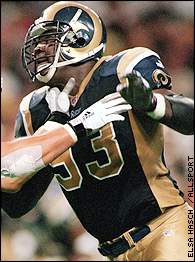|
|
|
Martz's moves shake up Rams' defense
|
 |
 |
|
Mike Martz is experiencing what drove Jimmy Johnson and Marty Schottenheimer out of the game. Only Martz is just fresh enough on the job -- just feisty enough, too -- that he has again sent a message to the rest of the NFL and his own team: the St. Louis Rams will not stick their heads in the sand just because they have an offense that is envied across the league.
|  | | Kevin Carter and the Rams have been unable to duplicate last season's defensive success. |
Martz's response to the Rams' 54-34 loss to the Chiefs was to act on his prior instincts. He brought in Bud Carson to oversee the defense that has been too complex, fundamentally unsound and uninspired. He benched a pair of Pro Bowl players, Kevin Carter and Todd Lyght, for their lack of effort and poor performance.
Carter, a defensive end who led the NFL with 17 sacks in 1999, protested his benching loudly, saying he has indeed given his best effort. Martz not only challenged that assertion but he made it clear that if Carter continues to practice with the same indifference this week that he could even be inactive Sunday against the 49ers.
Is Martz overreacting? Not according to a Chiefs' coach, who told us one day after the game, "If I were (Martz), I'd bench Carter's rear end. Just preparing for this game, and then playing it Sunday, the Rams are getting cheated by that guy."
Yet, it is clear that Carter, and even Lyght, are playing as if the Rams were cheating them. Both guys had contract issues after the '99 season, apparently exacerbated by the Rams' Super Bowl title and their own first Pro Bowl selections.
Lyght was blocked from free agency by the Rams' franchise tag -- a salary that pays him a little more than $4 million, not bad chump change. Carter had one year remaining on his original six-year deal signed out of college as the team's No. 1 pick. His base salary for 2000 is $1.1 million (he originally received a $5 million signing bonus).
Carter had an opportunity to sign a multi-year contract. In fact, the Rams' brass had three "star" players to address after the Super Bowl -- Carter, quarterback Kurt Warner and wide receiver Isaac Bruce. They budgeted enough money to sign two of the three players to long-term deals, valued around $42 million with $12 million signing bonuses.
Carter was given the first shot to sign a new deal. He wanted more money. He rejected it. Warner and Bruce were next, and they took the packages, with some tweaking.
The consequence is that Carter now knows that the Rams will use the franchise tag on him when the season ends, which will restrict his leverage. The interpretation of Carter's lackluster play this year is that he is sulking over his contract. He denies it.
The asinine aspect is that Carter only hurts his value by hurting his team. NFL club executives have grown reluctant to overpay for disgruntled defensive linemen, having witnessed wasted money and draft picks for such players as Sean Gilbert, Chester McGlockton, Dana Stubblefield and Dan Wilkinson.
Lyght, at least, admitted that his contract hassles motivated him to skip the team's off-season conditioning program as well as a portion of training camp.
|
“ |
Martz is showing healthy signs that he is the captain of the ship. If he has any repairs to do with the Rams, he is making them. ” |
When Jimmy Johnson re-entered the NFL with the Miami Dolphins, it took him only a year to recognize that money had changed the game and the players. Likewise, Schottenheimer feels the salary cap has handcuffed coaches from taking appropriate action when players shut it down, such as Carter has with the Rams.
For Martz, the coach is showing healthy signs that he is the captain of the ship. If he has any repairs to do with the club, he is making them, even if he is somewhat responsible for breaking some parts himself.
How? When Dick Vermeil retired after the Super Bowl and Martz was promoted, he felt compelled to choose between one of the Rams' co-defensive coordinators -- Peter Giunta or John Bunting. Martz chose Giunta, who handled the secondary, over Bunting, who coached the front seven.
In hindsight, it may have been the wrong choice. Bunting brought more passion to the defense and clearly had more success motivating the likes of Carter.
But Giunta had served as an assistant under Carson, most recently in St. Louis before Carson retired in '97 after Vermeil's first year. Martz believes Carson is the greatest defensive coach in NFL history, so he wanted that lineage from Giunta.
Carson is so admired by Martz that he told me, "He can have any title he wants. He can be co-head coach, if he wants. He will help us immeasurably, on both sides of the ball."
That's interesting because it probably will take Martz's high-powered offense to assume a slightly different role.
One rival head coach suggested Martz will have to slow things down: "When you're ahead 28-10 and you score in three plays, do you think that's helping the defense? He's going to have to be a little more methodical until he's confident Bud has fixed some things."
Another head coach with Super Bowl experience suggested three weeks ago that Martz "knows he can't win in January with that defense, no matter how good his offense is ... it doesn't work that way in this league."
As a Rams' official also told me this week, "You know, the worst thing -- and maybe the easiest thing for Mike to do -- would have been to wait until February and say, 'Yep, I knew back in September that these things were going to cost us.'"
|
|
|
|



